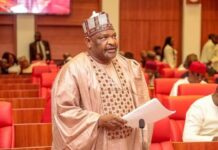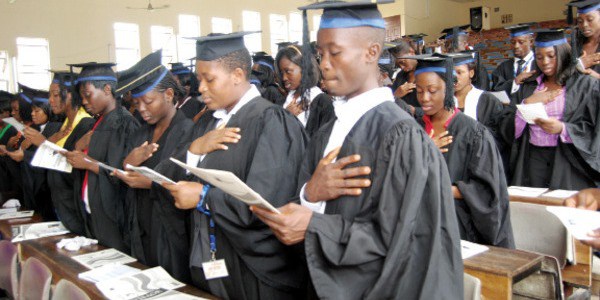Ibrahim Ahmad, 28, came back from India last year after obtaining a Master’s Degree in Power Electronics and Drives from the SRM University. He was one of 501 students given foreign scholarships by the Kano State government in 2012 to study various courses at the Masters level. The scholarships cover courses in social sciences, arts, environmental sciences, computer studies, medicine and engineering.
Although, the Bayero University and the Kano State University of Technology offer some of these courses, the state government thought studying abroad would broaden the knowledge and outlook of the students.
Ahmad, as well as many of the other beneficiaries, had graduated either from Bayero University or Kano State University of Technology with Second Class Upper degrees.
While studying in India, Ahmad was paid 7,800 dollars about per year as allowances for accommodation and pocket money by the state government. In two years of his study, that amounted to 15,600 dollars. The government also paid 14,000 dollars as tuition fees for the two years he spent in India. If this had been the cost, the state government spent 29,600 dollars on each of the 501 students. That is a total of $14.8 million. At today’s exchange rate, that is nearly N10 billion. And, it could be higher as those who studied medicine and other medical courses even got higher funding.
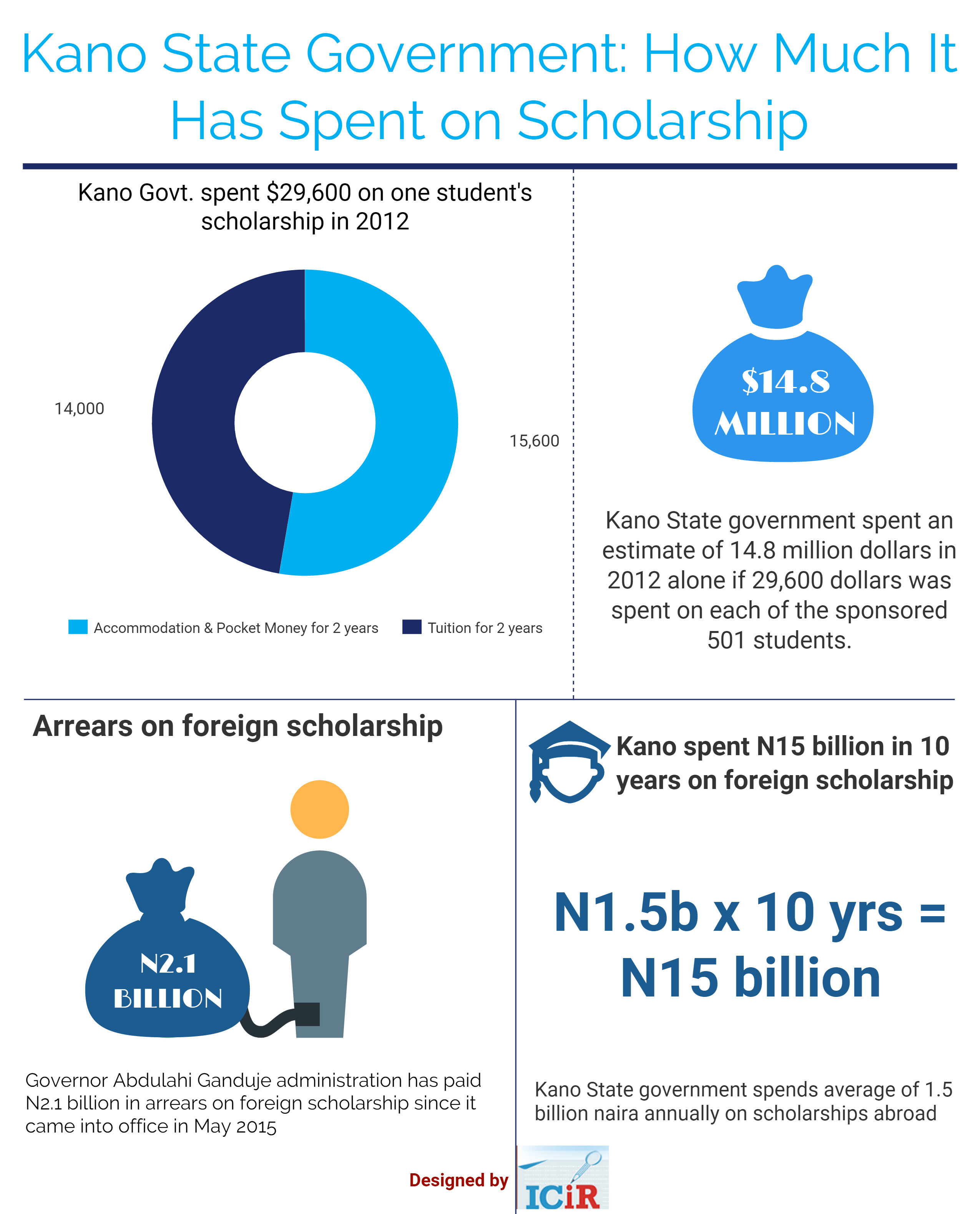
Before they travelled out to different countries in 2012, the government promised to give them jobs on their return. So the beneficiaries happily returned to Kano after their programmes to give back to the state that had invested so much in them.
But alas! Soon after their return, the story changed, and a new reality began to unveil itself. Government recanted and said there were no ready jobs. They were advised to watch out for employment opportunities in the future. Not satisfied, new graduates came together and formed a union last year to champion their cause.
After consistent pressure on the state government, about 60 of them or 12 per cent have managed to get jobs as lecturers in some of the tertiary institutions in the state. The remaining 88 per cent are now on their own, searching fruitlessly for jobs more than one year after their graduation.
By the grace of an uncle who is a politician, Ahmad managed to secure a job as a primary school teacher at LEA Bichi, in Bichi local government area of the state.
“When we came back the government told us there was no job. I went to all the higher institutions in the state but none could offer employment. I am now working as a primary school teacher because I couldn’t find any other job where my qualifications would be very useful,” he told icirnigeria.org as he mounted his motorcycle.
But compared to the situation of some of his colleagues, Ahmad appears lucky. Sani Hassan Garba also acquired an MSC in Information Security and Computer Forensic from SRM University in India. After searching fruitlessly for a decent job, his father convinced him to join him to hawk artefacts at the popular Kantin Kwori market. He told the reporter he hoped to start an Internet café business in the future if he is able to raise funds.
Another indigene of the state who was sent abroad by the state government to train as a pilot, but who refused to give his name, told our reporter that he got a teaching job at a government secondary school to teach Geography.
“I am managing in the school. At least it is better than roaming the streets without doing anything. But it is actually a waste of resources on the part of government if a pilot is forced to teach Geography in a rural school,” he lamented.
There are many who share the view that committing such huge resources to training youths without any plan to engage them is not only a waste of public resources but also betrays a glaring lack of vision of leaders in the state and, by extension, the country.
Kano, for instance, has no bond with beneficiaries of its scholarship programmes to make them serve the state after coming back home. The state started awarding scholarship since 1968. It currently has a total number of 445 students in various countries abroad studying for their Masters degrees. The countries include Cyprus, Egypt, China and Sudan.
Thus, while being unable to provide jobs for those who enjoyed scholarships in the past but have returned home and have no jobs, the state government is still spending enormous resources on sending students abroad without a thought to what they would do upon completion of their courses.
The Governor Abdulahi Ganduje administration has paid N2.1 billion in arrears on foreign scholarship since it came into office in May last year to avoid the students being sent out of school. Although the Kano State Scholarship Board said it could not give any data on what it has spent on foreign scholarship in the last 10 years, sources within the board said the state spends an average of N1.5 billion on scholarships annually. If the figure is to be believed, Kano State has spent not less than N15 billion on scholarships in the last 10 years.
But despite the funds committed to their education abroad, many of them would not be engaged by the state and are not bonded to serve the state after graduation.
Fatima Umar, a professor and Executive Secretary of the Kano State Scholarship Board, declined to comment on the issue and instead referred the reporter to the commissioner for Information, Mohammed Garba.
Garba agreed that it was a waste of resources to spend so much on a student and not have any plan to engage them.
He said: “This is something we inherited. There is no any bond with them. Even if we have a bond with them, where are we going to put them? Those who went to study piloting, do we have aircrafts in Kano? Even Nigeria does not have aircraft. So you cannot have any bond with such students. That is why I said there was no planning, we just send our students abroad to do anything.”
The commissioner said that the Ganduje administration was poised to review the state scholarship scheme to reflect current financial position of the state and its manpower need.
Same story in Jigawa
In Jigawa State, as well as many of the states in the North, every student studying in a tertiary institution is entitled to bursary award of not less than N10,000 per annum. There has been a gradual increase in the number of indigenes of the state studying in tertiary institutions across the country.
From a total of 10,826 in 2007, the state now awards bursary to 21,264 students in the current year. That means that the state governor is spending N212,6 million on bursaries in 2016.
But local and foreign scholarships are limited and are awarded for only courses that could help address the manpower needs of the state in the health sector and engineering. Apart from these fields, the state has also taken it upon itself to give foreign scholarships to students interested in Islamic education. The state borrowed the template of Kano State and pays as high as its richer neighbour.
Between 2007 and 2012, the state spent a total amount of N2.1 billion on local and foreign scholarships alone. This news website could not obtain data for current scholarship expenses.
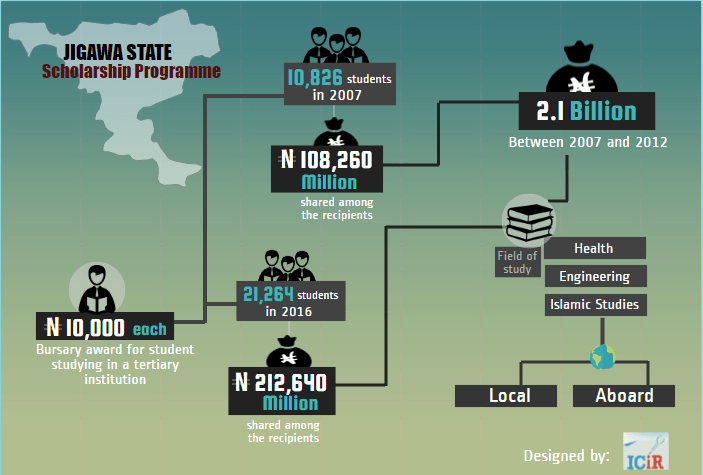
But out of all those who get the foreign or local scholarships, only medical students are bonded. According to Babandi Gumel, Executive Secretary of the Jigawa State Scholarship Board, this is because the state requires manpower in the health sector, especially in the rural areas.
Medical students on state scholarship are enrolled on the state civil service payroll and place on level “0” 7 once they get to 300 levels. After their graduation from medical college, they are given permanent employment.
Giving reasons for the bond, he said many of the beneficiaries in the past secured jobs in other state after their graduation thereby denying the state of needed manpower. He said now it is impossible for any medical student who signed the bond to work elsewhere after graduation without consequences.
He said a beneficiary who got a job with the National Hospital, Abuja after graduation was compelled to relinquish the appointment when the state under former governor Sule Lamido, protested to the authorities at the hospital.
Hassan Takai, who studied Geography on the state scholarship and graduated in 2014, told our reporter that when he could not get a job, he went into “Okada business”. In essence, he became a commercial motorcycle operator.
Takai said there are many of them who have been jobless for years after graduation. He however declined to allow the reporter take his picture for fear that he may embarrass the state government.
“I still have to be grateful that the state made it possible for me to have a university degree, something my parents were not able to afford,” he said.
In Lagos, Beneficiaries Sign Bond To Serve State For A Year
Tope Ogunyemi, one of the indigent students who got Lagos State government scholarship to get their degrees, studied Civil Engineering at the Lagos State University, Ojoo. He graduated in 2013 but is yet to find suitable employment. He has tried the state civil service but to no avail.
After taking his CV around for more than a year, he finally got employed by a local contractor who now uses him as a personal assistant.
Ogunyemi is one of about 400 students who get Lagos state scholarship every year to study for degree programmes in local universities and polytechnics. These categories of beneficiaries are not bonded to serve the state after their education, the aim only being to give education to indigent youths in the state.
Apart from scholarships, the state government also gives bursaries to students from the state. Student on bursary get between N25,000 (for arts students) to N50,000 while scholarships range from N200, 000 to about N1.5 million, depending on if it is local or foreign.
It was learnt that only those granted foreign scholarships are bonded to serve the state when they finish their programme. According to Kehinde Fashola, Public Affairs Officer at the State Ministry of Education, this is so because foreign scholarships are targeted at the areas of need of the state and involve huge financial commitments.
Foreign scholarships are given for postgraduate studies in medical sciences and some engineering courses, although this has been suspended for now due to paucity of funds. After their studies, “they will serve the state for at least one year before they are allowed to go elsewhere, and usually while they are serving the state they are put on certain allowances.”
Lanre Ogunyemi, chairman of the Lagos State House of Assembly Committee on Education, toldicirnigeria.org that government sees scholarship award more “as social responsibility to the people instead of investment in manpower development.
Even then he agrees that there is no sense in awarding scholarships without planning for how to employ the graduates.
“I really think it’s not a good thing for our system to give scholarship to people and not employ them, because it defeats the very purpose of investing in them.”
This is why, according to Fashola, the state has come up with an entrepreneurship programme for all final year students in the state’s tertiary institutions. The programme, which was started in June last year, is designed to address graduate unemployment in the state.
“We have just started a programme called Ready-Set-To-Work-Initiative. It is a 13-month programme to prepare graduate students for jobs. It is supported by the private sector and we have started with 500 students.
At the end of the programme, our private sector partners will give them six months’ internship after which some of them may get full employment. Some of them may even become entrepreneurs after the programme,” she stated.
Ogunyemi said the programme is a way of addressing the shortcoming of the scholarship programme: “It is not possible for government to employ every unemployed graduate. I think we should also ask that all the graduates being churned out of the tertiary institutions in the country, are we providing employment for them? The answer is No. But they can still be useful to the state if they are engaged by the private sector or self-employed. And that is why the Lagos state government is trying to diversify,
“The government is now advocating for vocational training. In our institutions here, there is a programme for final year students on self- employment. I think government wants to ensure that for those who would not be employed in the civil service, there is an alternative, which is what Lagos state is doing-preparing graduates for life outside the civil service.”
States Reviewing Scholarship Schemes
Many states, especially in the south where there is relatively higher rate of university educated youths, are now reviewing their scholarship schemes to reflect changing times and reduce financial wastages.
Lagos state has suspended foreign scholarships and may not sponsor any student in the years to come. Rivers State Government has also stopped the Governor’s Special Overseas Undergraduate Scholarship.
Need For A Review Of FG Scholarship Programme
The federal government has not fared better in terms of utilising investments in scholarship education. Even though many awardees of federal government scholarships studied courses that are badly needed in critical sectors such as health, maritime and engineering, many of them are not bonded and have returned to the country to roam the streets.
The Nigerian government through the Federal Scholarship Board, FSB, offers three categories of scholarship – the Bilateral Education Agreement, BEA, Award, the Commonwealth Award and the National Award for universities and other tertiary institutions in Nigerian.
The National Award had been stopped since 2014 and only the Commonwealth and the BEA are still offered. Even the commonwealth scholarship has run into hitches as a result of the Boko Haram crisis. Many of the commonwealth countries no longer send their students on exchange programme to Nigeria due to fears about their security. So, only the BEA is really fully operational.
Not less than 1,000 Nigerian students are currently in 16 BEA countries on scholarships in different disciplines including medicine and engineering courses. The countries include Japan, Romania, Hungary, China, Egypt, Algeria and Cuba. Others are Greece, Macedonia, Mexico, Morocco, Russia, Serbia, Tunisia, Turkey and Ukraine. The host countries pay for only tuition for the awardees while Nigeria picks the bill for their accommodation, upkeep and other things.
A student on BEA scholarship for post graduate studies is paid a minimum of N880,000 every year, but in most cases they don’t get the money until a year later.
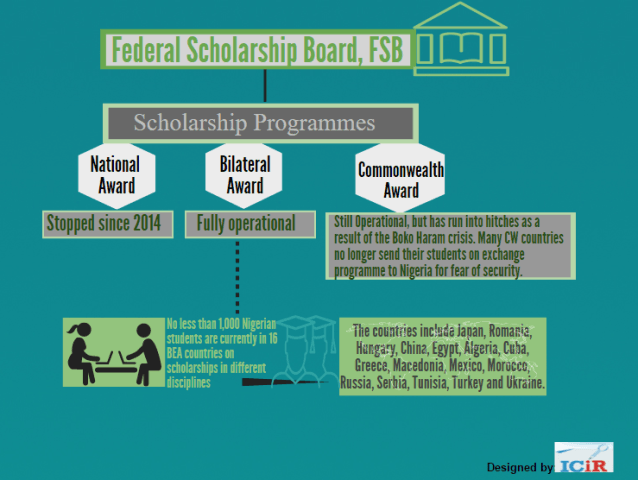
Information about the activities of the FSB, particularly regarding the number of students on local and foreign scholarships as well as amounts spent on them is hard to find. Section 2, sub sections 3,4 and 5 of the Freedom of Information act, FOIA, 2011 require that public institutions proactively provide information in their custody to the public.
The scholarship board has not made public information in its hands available anywhere, not even on its website and when this news website requested for such information, it was denied.
The website did a Freedom of Information Act request to the Federal Scholarship Board, for data on the number of beneficiaries and amount spent on foreign scholarships in the last five years. The request letter dated August 9, 2016, was addressed to the agency’s Director.
When the icirnigeria.org went to the FSB office to enquire about the request, a secretary said the board was still working on it and promised to get back to the reporter when it was ready.
But on September 26 when the reporter went back, it was still the same story. “Don’t you know the information you request is much, and it will take time to get all the data,” the secretary told the reporter.
A deputy director at the federal scholarship board who spoke on condition of anonymity told icirnigeria.org that many of the overseas scholarship beneficiaries have been coming to the board for job placement.
Joel Oruche, Deputy Director, Public Relations at the Federal Civil Service Commission, insisted that all overseas scholarship graduands must have signed a bond that they would return to work for the country. “If they return and come to the civil service commission for job placement, it is usually automatic employment for them. But if anyone does not come to the commission there is nothing we can do,” he said.
But sources within the commission confirm to icirnigeria.org that Oruche was only protecting the image of the government and that there was nothing like automatic employment for scholarship beneficiaries. In fact, the experience of some of the beneficiaries also put a lie to Oruche’s statement.
Vowa Marigold, from Delta state, told our reporter she had gone to the Civil Service Commission and other government agencies many times without success. She was one of the Nigerians who got the BEA postgraduate studies scholarship to study Public Health in Serbia after graduating from medical college. She returned to the country in 2014 and is yet to get employment.
“I went to the scholarship board to help look for job placement in any of the agencies under the ministry of Health but they told me they don’t employ, and that I should go and look for employment by myself,” she said.
Marigold said she went to all the relevant government agencies, including the National Agency for the Control of Aids, NACA, to no avail. She eventually returned to Asaba to work in a small private hospital.
“I am not the only one that is still unemployed. The government did not give anyone of us automatic employment. Those who secured employment did so on their own,” she declared.
Chucks Nwagwugwu, another beneficiary of the BEA post graduate studies scholarship, studied Civil Engineering and Construction in Hungary. He, like Marigold, graduated in 2014. After roaming the streets for nearly a year, he finally got a teaching job in a state university in the Southeast.
Nwagwugwu told icirnigeria.org that he thought he would be posted straight to the Federal Ministry of Works on his return to the country.
“It was a shock to me that I have to start searching for job on my own even when I know that the government needs professionals like me in the Federal Civil Service,” he stated.
The Petroleum Development Trust Fund, Another Drainpipe
The federal government, through the Petroleum Technology Development Fund, PTDF, has also been making investments in educational scholarships that are becoming increasingly counter-productive.
The PTDF was set up to develop indigenous manpower for the petroleum sector – a mandate it has dutifully executed. It has sponsored not less than 870 Nigerians for bachelors and master’s degrees in foreign countries in Petroleum Engineering, Geology, Geo-physics and so on.
It has also sponsored 700 PhD students in different countries. In the area of technical skills such as welding and fabrication, PTDF has trained 1,600 Nigerians, and many are still in training.
PTDF scholarship is the most generous in the country, covering tuition, feeding, accommodation and other allowances for the beneficiaries and their immediate families. Some beneficiaries get as much as N3.5 million per year.
As with the FSB, Information about scholarships awarded by the PTDF is also hard to come by. Efforts to obtain data from the agency proved abortive as nobody was ready to avail our reporter with any.
Even a Freedom of Information request seeking information on the subject matter failed to yield results. In the letter dated August 8, 2016 and addressed to the acting Executive secretary the icirnigeria.org demanded information on the number of scholarship awards given to Nigerians from 2011 to 2016, the total costs of all local and foreign scholarships, including a breakdown of beneficiaries and how much each got and the current state of on going scholarship awards. Repeated trips by our reporter to the PTDF headquarters in Abuja also did yield results.
Surprisingly, on October 18 more than two months after the request was made (the law specifies a 7 – day timeline), the fund in a letter signed by B. Z Ahmed, GM, Legal and Secretarial services department, for the Executive Secretary said that it could not provide the requested information as it was already in the public domain.
“We wish to state that the information you requested is within the public domain and can be accessed on our website www.ptdf.gov.ng,” the Fund stated.
Observing that the Fund had discharged its responsibilities “in a transparent, effective and efficient manner and in accordance with the law establishing it,” the Executive Secretary stated: “By virtue of section 26 (a) of the Freedom of Information Act, 2011 which states that “this Act does not apply to published material or material available for purchase by the public.”
However, the Executive Director lied as none of the requested information is on the Fund’s website. The only information relating to scholarships on the website concern only the courses for which scholarships are awarded, types of scholarships and who is qualified.
The specific information requested by the news website relates to the “number of scholarship awards given to Nigerians between 2011 and 2016, including name of beneficiaries, course of study and duration as well as schools attended.”
The request also included “the total cost in local and foreign currencies of the scholarships awarded in the said period (2011 -2016), including a breakdown of how much each beneficiary got.” No such information is available on the PTDF website.
The Act quoted by the executive Secretary also provided for a N500,000 fine, upon conviction, for any public official who wrongfully denies information to citizens.
Even as the PTDF continues to sponsor young Nigerians abroad ostensibly for courses relevant to the petroleum industry, the problem is that when they return home, Nigeria and many of the International oil companies do not employ them.
According to Femi Ajayi, immediate past Executive Secretary of the PTDF, part of the problem is that multinational oil companies prefer to ship in their staff from abroad instead of employing qualified local hands.
He said Nigeria would be wasting huge resources if those it trained are not employed to take ownership of the sector.
“That’s why we call on government every day that the issue of expatriate quotas and local content need to be enforced. If you don’t make it compulsory for them to employ qualified Nigerians, they will not do it.”
Lack of employment opportunities has forced many of the beneficiaries to other countries. According to Ajayi, many of them have found employment opportunities in Aberdeen Scotland in the United Kingdom, Houston Texas and in Canada.













